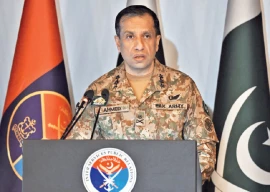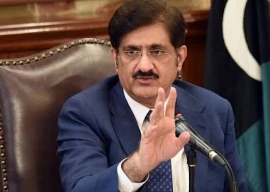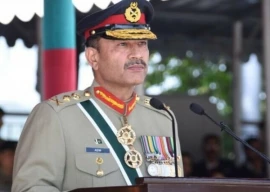
“The bill will formally be signed on July 21 (Friday) by the committee for its onward submission to parliament for approval,” said Finance Minister Ishaq Dar, who is the chairperson of the committee.
The Pakistan Tehreek-e-Insaf (PTI) boycotted the Wednesday’s sitting of the committee at the Parliament House, saying its four major demands – voting right for overseas Pakistanis, reconstitution of the Election Commission of Pakistan, biometric verification of voters and criteria for the appointment of caretaker governments at the federal and provincial levels – have not been met.
Election commission be reconstituted, demands PTI
Moreover, the Jamiat Ulama-e-Islam-Fazl (JUI-F), the Jamaat-e-Islami (JI), the Muttahida Qaumi Movement (MQM) and the Awami National Party (ANP) wrote dissenting notes on different issues.
The JI and the JUI-F opposed a clause of the bill under which “less than 10 per cent turnout of women voters in any constituency will make the election void” and termed the clause in violation of the fundamental rights.
Besides, the JI also submitted a dissenting note aver unlimited election expenses by political parties during the general election, voting right to overseas Pakistanis, biometric verification of voters and financial autonomy for the ECP.
The MQM’s dissenting note was about publication of extra ballot papers, while the ANP objected to some procedural issues in the bill.
“Nine major election laws have been merged in The Election Bill, 2017 as per best international practices, with the input of all political parties having representation in parliament,” Dar said.
He said the bill had been finalised in less than two years and every political party had given its input in the proposed legislation for a broader consensus.
Electoral reforms: PTI decides not to back off from its proposals
In December 2016, the government had come up with a 149-page draft bill on the electoral reforms – The Election Bill, 2017 – that primarily focussed on fine-tuning the existing election laws in the country.
The parliamentary committee on electoral reforms – formed by the government after the PTI’s 2014 marathon sit-in in Islamabad – had drafted the bill after deliberations lasting more than two years.
The government had received some 631 proposals from various political parties and citizens to draft The Election Bill, 2017 that was tabled before the National Assembly in December 2016.
Dar said the bill had been finalised after 118 meetings – 25 of the main parliamentary committee and 93 of a sub-committee headed by Law Minister Zahid Hamid.
Besides the main law, he said, related rules had also been finalised in collaboration with the ECP.
Recently, the ECP expressed its reservations over the delay in the enactment of electoral reforms, saying delays would impact quality of the next general election.
PTI voices reservations
Addressing a news conference at Bani Gala, PTI Chairman Imran Khan expressed strong reservations over the finalisation of the bill sans the PTI demands.
He said “millions of overseas Pakistanis, who contribute $20 billion to the country’s economy, supports the PTI”, and “this is why the government is reluctant to give them the right to vote”.
The PTI chief said that the Supreme Court, in its decision on the issue, categorically stated that the overseas Pakistanis must be given their right to vote. Despite this, he added, the ECP and Nadra had been delaying instituting a viable system to allow these Pakistani citizens their right to vote.
Over eight million eligible Pakistani citizens with Nicop and Pakistani passports were legally entitled to vote, he said, adding that after the PTI’s persistent demand Nadra had proposed a secure electronic system, but it had been shelved by the ECP.
“[The] PTI finds this unacceptable,” he made it loud and clear.
About the ECP’s restructuring, the PTI’s second major demand, Imran said 22 political parties had called the 2013 general election ‘flawed’ and a judicial commission had found 44 different types of irregularities, suggesting rectification in the election system, but no one had been reprimanded on them to date.
“So how do we know if the next election will be free and fair?” he exclaimed. “We can see how that has impacted subsequent by-elections, with every political party screaming ‘rigging’.”
He continued: “It's not about just one government or one party having faith in the election commission. It has to be such a commission that is neutral to all players and that everyone has confidence in. We demand reconstitution of the Election Commission of Pakistan.”
About the criteria for the appointment of caretaker government, Imran said: “Every Pakistani remembers how the PML-N and the PPP made a caretaker government nine days before the last general election, and even former caretaker chief minister of Punjab Najam Sethi had said that all authority had gone to Shehbaz Sharif in Model Town.”
He said that a caretaker government should be appointed taking all parties on board.
About the biometric verification of voters, the PTI chief said the introduction of that system would remove the issue of stamping multiple ballots, but the government was refusing to adopt it.
1736942026-0/fizza-(33)1736942026-0-405x300.webp)

1736941045-0/fizza-(32)1736941045-0-165x106.webp)
1736940015-0/BeFunky-collage-(53)1736940015-0-165x106.webp)

1736942257-0/Tribune-N-(5)1736942257-0-270x192.webp)


1736941269-0/sidra--(9)1736941269-0-270x192.webp)


1732012115-0/Untitled-design-(14)1732012115-0-270x192.webp)
1736844405-0/Express-Tribune-(2)1736844405-0-270x192.webp)










COMMENTS
Comments are moderated and generally will be posted if they are on-topic and not abusive.
For more information, please see our Comments FAQ